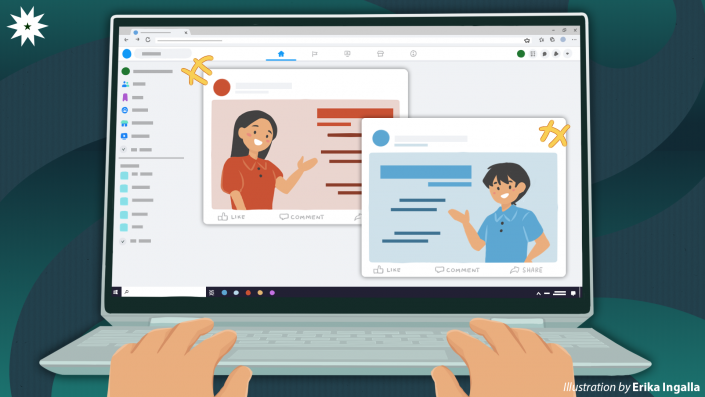
Back in the good old days, the University elections season was always an interesting time on campus. The familiar political party colors would flood the grounds, excitement in the air as candidates knock on classroom doors to present their platforms and party representatives ask for a moment of your time.
Azhley De Quiroz, Interim Executive Secretary of Alyansang Tapat sa Lasallista (Tapat), describes the party’s face-to-face campaign as “thrilling and powerful.” She adds, “Anyone who would walk past the Henry Grounds during the Miting De Avance or was inside a classroom during a room-to-room campaign would agree.”
But as luck would have it, an unprecedented challenge arrived: political parties now have to mount fully-online campaigns—a task that entails starting their marketing strategies from scratch. With one online election season already under their belt, the University’s political parties are facing the next one with renewed hopes.
Into the cyberspace
The pandemic did not just change the elections—it also dampened students’ participation in the parties’ activities. “The pandemic presented so many challenges to us as individuals, as students, and the drive to serve the student body became something hard to come by,” Martha Louise Delos Santos, president of Tapat, shares.
But Tapat rose to the occasion. They implemented regular constituency checks on their members, ensuring that the party provides adequate support. While the online setting made coming together challenging, they still managed to hold training sessions and reinvent their internal activities so each member could contribute. “Vision without action can only do so much,” she adds.
Similarly, De Quiroz laments the lack of opportunities for active engagement from the student body. “There is no doubt that a face-to-face campaign has a more personal approach…It is easier to connect with your constituents,” she discloses.
For Santugon sa Tawag ng Panahon (Santugon), creating a bridge between candidates and students and motivating them to participate in the political process is the priority amid the online learning setup. Outer Core President Kylie Robles reveals that they have pivoted to online strategies such posting infographics on social media in a bid to utilize the medium’s accessibility. However, she notes that when campaigning is purely online, connecting with the students feels like a “one-way type of interaction.”
Herculean effort
“It’s truly more challenging to maintain the same level of power that Tapat always strives to achieve back when we campaigned room-to-room,” confesses Delos Santos. Unlike before, parties have a harder time of gauging how well their campaigns are doing. There are no crowds to play off of, no palpable elections atmosphere—they are on uncharted territory.
Robles does not see the online setup as a limitation, but concedes that it “led to the absence of more means of dialogue and conversation regarding platforms and ideologies.” Meanwhile, De Quiroz acknowledges that it opened opportunities for more creative and impactful campaign strategies. “It is easier to reach out to students,” she adds.
As the election landscape continues to unfold, it is safe to say that the game is changing. In the previous Make-up Elections, reports of party representatives asking students if they voted and who they voted for surfaced. Both parties were quick to condemn this practice. “We (Tapat) are against any and all forms of voter harassment,” De Quiroz answers.
On the other hand, Robles asserts that asking someone if they voted is “an exercise of participatory democracy within a University-setting,” especially since some students had encountered difficulties voting online.
Some getting used to
“It (the online setup) fundamentally changed how students would interact with the parties, most especially the running candidates,” De Quiroz divulges. Because of the less personal approach in online campaigning, students experience difficulties in getting to know the candidates and their platforms.
Delos Santos echoes this concern, saying, “It’s worrisome to some extent how much harder it is to properly reach out to students while maintaining the level of ingenuity.” Students tend to be less receptive in the online set up, and with the issue of voter’s education among the students, Delos Santos emphasizes that it’s harder to put a pin on the student body’s sentiments.
On the other hand, Robles believes that the dedication of their candidates to serve the student body is most apparent in the online setup. “The change of the online elections may not be ideal, but it is necessary to ensure that Lasallians are properly represented, especially in these trying times,” she explains.
For the better
“We might be physically apart for now, but we learned that we can still come together,” says Robles. While the online setting may be an entirely new playing field, both parties have not lost sight of their goal of providing students with an avenue to express their concerns about issues inside and outside the University.
Despite the big changes, it is still important to let the Lasallian student’s voices be heard in the University elections. De Quiroz shares, “The essence of providing quality platforms and enhancing the voices of students on electing leaders to represent them has never changed regardless of the change in setting.”
